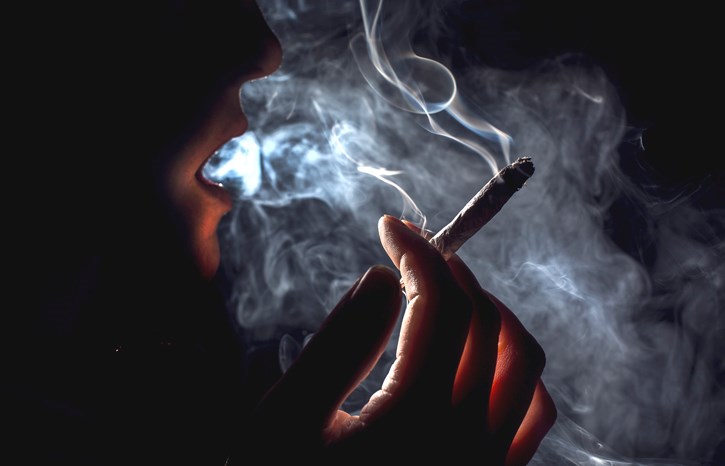CANMORE – With just hours to go until recreational cannabis was legalized across Canada, Canmore’s elected officials voted to ban public consumption of the legal drug in the municipality.
On Tuesday night (Oct. 16) council voted in favour of a staff recommendation to restrict the public consumption of cannabis by smoking or vaping, but the vote was far from unanimous.
While Mayor John Borrowman and four councillors approved the new bylaw that restricts the activity in public places, councillors Joanna McCallum and Esmé Comfort were opposed.
Borrowman acknowledged his opinion on the issue has slowly changed over time, from having concerns around a public consumption ban to supporting the more cautious approach to legalization put forward by administration and public health advocates in the community.
“When we first started talking about this some time ago, all of us were struggling with what is the right answer for the town of Canmore,” said the mayor. “For some time, I personally was thinking less restrictions would be the direction I would prefer rather than more restrictive. But then I got on the fence and … now I believe for a number of reasons that applying more stringent restrictions as is recommended in the report is the way to go for the town of Canmore.”
Borrowman noted there are still many unknowns around cannabis legalization moving into the future and put forward a motion directing administration to return by October 2020 with a report on how the major societal change is playing out in the community.
Coun. Jeff Hilstad said with further legislation expected from the federal government within a year related, to edibles and options for possible cafes or lounges in the future, he was happy to support the new bylaw.
“It is a little unfortunate we don’t have cafés or lounges available,” Hilstad said. “For now, I think this is the safest option to get our feet wet and see how it goes.”
While debate over cannabis regulations has drawn comparisons to how tobacco and alcohol is or isn’t legislated in public places, McCallum argued that it is different and should be analyzed on its own merits. She pointed out that restrictions on public consumption of cannabis places renters and those living in multi-family residential properties in a situation where they have no legitimate avenue to partake in legalization.
“More than half the households in Canmore will potentially be unable to consume a legal substance based solely on housing choice,” she said, adding enforcement of the new bylaw is also uncertain given municipal resources.
“I believe when we pass laws that are unenforceable, or there are no resources to enforce them, we undermine public confidence in decision makers and those employed to enforce the bylaws.”
For Comfort, the fact that a public consumption ban means the only place people would legally be able to consume is on certain types of residential property was the main reason she could not support the bylaw.
“If you are not a private property owner there is nowhere to go, so I am having a little bit of trouble,” she said, adding there is also nowhere for hotel guests to take advantage of legal cannabis either.
“It is legal, but you can’t consume it anywhere … I have trouble with that when it comes to our visitors.”
Manager of protective services Greg Burt presented the recommended bylaw to council, along with several options for elected officials to consider like investigating the possibility of public consumption sites.
He said legalization of cannabis is unprecedented for Canadians and difficult to legislate, as it has some similarities with both smoking tobacco and drinking alcohol, but not enough to clearly chart a course into the future for regulations.
“I have to say this is by far the most challenging report and recommendation I have had to draft,” Burt said.
“There is so much uncertainty around the impacts of legalization of cannabis tomorrow … for Canmore, Alberta and Canada.”
Burt noted local public health advocates have pushed for bans similar to alcohol given that it is an intoxicating substance and the concerns around normalizing smoking, especially for children and youth.
“Based on that, given all the uncertainties and the newness of the legislation of legalization, I am recommending we take a more restrictive approach to start and loosen it up in the future if there is good reason to do so,” he said.
Given that council adopted a new municipal bylaw, enforcement would be the responsibility of Bylaw Services peace officers.
Manager of Bylaw Services Michael Orr said enforcement of complaints would be based on what resources are available at the time.
“It would depend on the nature of (the complaint) and we do understand the reality of catching someone with a 15 to 20 minute response time,” Orr said. “If we had an officer in the vicinity, we would respond and take enforcement action … but it depends on the nature of the complaint and the resources available.”
RCMP are also able to issue municipal bylaw tickets, and the fine in the bylaw was set at $100. Those who use medicinal cannabis are exempt from the ban, however would have to provide a valid prescription to law enforcement if asked.




